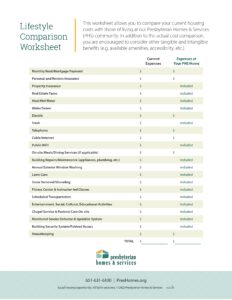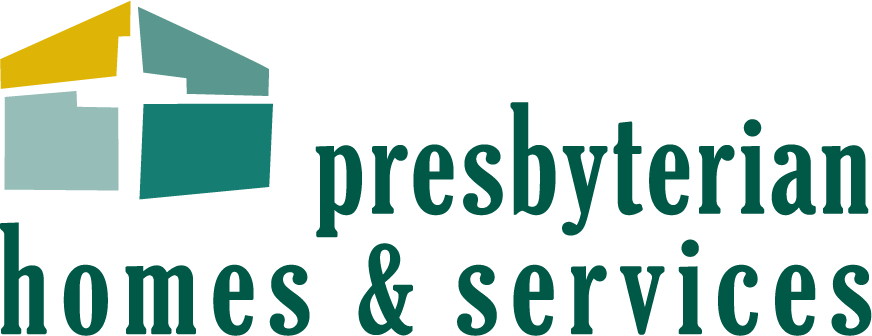 Many older adults believe senior housing is beyond their financial means. In fact, senior housing may be more financially reasonable than even living in one’s own home.
Many older adults believe senior housing is beyond their financial means. In fact, senior housing may be more financially reasonable than even living in one’s own home.
“Many people come to me and say, ‘Well, I own my own home, and I don’t have any bills,’” reports Michelle Gaertner, a housing counselor at St. Andrew’s Village in Mahtomedi, Minn. “But with any home, there are maintenance and repairs, real estate taxes, property insurance, snow removal, lawn care, water/sewer and more.”
Those costs can easily exceed the monthly rent included in senior housing.
Putting pencil to paper
One useful tool, available free-of-charge to prospective residents from Presbyterian Homes & Services (PHS) housing counselors/advisors, is a Lifestyle Comparison Worksheet. This tool can help you compare your current expenses against those included at a PHS senior living community. This worksheet can also be easily used to compare costs at non-PHS senior living communities to your current living situation.
available free-of-charge to prospective residents from Presbyterian Homes & Services (PHS) housing counselors/advisors, is a Lifestyle Comparison Worksheet. This tool can help you compare your current expenses against those included at a PHS senior living community. This worksheet can also be easily used to compare costs at non-PHS senior living communities to your current living situation.
Understanding your financial resources
Residents of PHS housing may have a number of resources from which to draw.
- Personal assets: These include: the sale of one’s home; pension funds; retirement accounts; Social Security; and personal savings. Residents drawing from these resources to pay for senior housing and care are considered “private pay” residents, meaning they pay for their housing using their own private resources.
- Public programs: Some PHS communities may accept certain public payment sources. Family Care is a state of Wisconsin funding program for Medicaid-eligible frail elders and adults with other disabilities. Family Care program members receive supportive services to living in their home or community-based setting whenever possible. Similarly, the state of Minnesota has a Medical Assistance program called Elderly Waiver for people who need a level of care provided in a nursing home but who chose to live in their own home, apartment or assisted living facility.
- Medicare: Medicare is a federal program which helps pay for certain medical expenses for those over the age of 65. Medicare does not provide financial coverage for the cost of independent living, assisted living or memory care. However, skilled nursing visits, physical, occupational or speech therapies, and hospice care – may be covered by Medicare if certain criteria are met.
- Third-party long-term care insurance: Should you hold a long-term care policy, your insurer may be able to provide reimbursement consistent with your contract’s coverage.
Flexibility is key to finding “just the right place”
Although some campuses may not have a lot of availability, it’s important that future residents understand there is a whole network of PHS communities across Iowa, Minnesota and Wisconsin. Of course, each PHS community is unique, and amenities and rents vary. At some PHS communities, refundable entrance deposits are also required.
Both Laura Bracklein, a housing counselor at Stonecrest in Woodbury, Minn., and Michelle say they routinely help residents move into senior living communities that are “just right” for their financial situation.
“It’s not always about the size of the apartment,” says Laura. “The layout can have a huge impact, too, regarding storage space and closets. It’s not just about money; it’s about people’s possessions and thinking about how to leave non-essentials behind.”
If you should find yourself financially struggling …
At times, PHS residents struggle financially due to the death of a spouse, outliving one’s income or a dramatic health or financial setback. “We try to serve residents and prospects in the best way,” says Michelle. “We don’t want to leave them floundering or hanging with a huge set of questions where they don’t even know where to start.”
Solutions may be found in apartment downsizing, PHS benevolence, public assistance (for those who qualify based on care needs, income and assets), or – in very rare cases — moving to a less costly community.
Parting advice
Laura tells her clients, “Get into the community you want to be in now instead of having that decided for you later. Make sure when you are looking for a place to live, you are looking for where you want to LIVE, not where you want to spend your last days.”
Michelle concludes, “Nobody has ever looked at me and said, ‘Boy, I moved in too soon.’”
Learn more about understanding your finances here.



